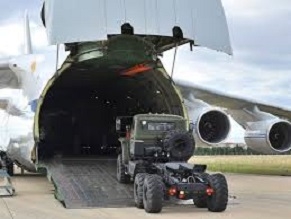|
Analytics

Military vehicles and equipment, parts of the S-400 air defense systems, are unloaded from a Russian transport aircraft, at Murted military airport in Ankara, Turkey, Friday, July 12, 2019. (Turkish Defence Ministry via AP, Pool)
|
How Russian Missiles Shot Down Turkey's F-35 Jets
19.07.2019, Israel and the World Almost four years have passed since the Turkish Air Force shot down a Russian Sukhoi fighter plane flying over it. Immediately after that a rift was torn between the two countries, including harsh economic sanctions on Turkey, such as preventing trade, closing Turkish factories, suspending Russian tourism to Turkish holiday sites and no communication between the two presidents.
This week the tables were turned. Russian anti-aircraft missiles effectively struck down the F-35 planes intended for Turkey. Erdogan’s decision to ignore the American demand and NATO’s objection, and perhaps also his wrong reading of the political reality in the United States, led the White House to announce its plans to oust Turkey from the project of building the advanced plane and suspend the transfer of the 30 planes in construction stages to the Turkish air force.
If the American decision isn’t changed it will be fully implemented in March 2020 and could at the first stage cause Turkey economic damage, especially to the Turkish military industry, which is building about 900 components of the plane.
The blow could be a long-term one because it is seen as the summit of a diplomatic and trust crisis between Washington and Ankara. It could affect foreign investors’ readiness to act in Turkey. Also, Turkey is expected to be dealt another dose of American sanctions, under the American sanction law that will define Turkey from now on as a rival state, due to its purchasing Russian weapons.
It’s not clear yet what sanctions Trump will impose and what their political impact will be, but their influence will be serious because they will place Turkey officially as part of the Russian axis.
Some three months ago Turkish Foreign Minister Mevlut Cavusoglu astounded the participants of a NATO convention in Washington marking the organization’s 70th anniversary, when he made it clear that Turkey must balance its relations between Russia and the other states. “We don’t see our relations with Russia as an alternative to our relations with other states and nobody, not Russia and not the West, should or can demand we choose among them,” said the foreign minister of a NATO member state.
This seemed to echo the old Turkish policy that was based on the “zero-problems-with-the-neighbors policy” formulated by Former Foreign Minister Ahmet Davutoglu. But Turkey has since become a state whose relations with its neighbors are riddled with rivalries and divisions. It is conflicted with Egypt and Saudi Arabia, its relations with Israel are tense, the severance with Syria is complete, it’s at loggerheads with the European Union and has managed to systematically unravel its relations with Washington.
Turkey chose the strategic partnership with Russia over the United States during the war in Syria. Turkey’s national and security interest wasn’t compatible with an alliance with the United States as well as the massive help the Trump administration gave the Syrian Kurds, which Turkey sees as terror organizations threatening its security.
The efforts to find a satisfactory solution failed and the Turks’ need to rule in northern Syria and block Kurdish activities there overcame the international interest. This disagreement was also nourished by Trump’s decision to recognize Jerusalem as Israel’s capital and move the U.S. embassy there, and cooking the deal of the century from which Turkey was totally excluded.
Trump, who at first was seen as Turkey’s friend and Erdogan’s personal friend, is now seen in Turkey as a president driven by Israel and therefore suspected of anti-Turkish motives. But despite the tense relations between the two leaders, Erdogan continued to believe that Trump wouldn’t punish Turkey, whether because Turkey was too important to him, or because he relied on Trump’s promise not to impose sanctions on Turkey, as he explicitly said after the G-20 convention in Osaka.
Did Trump lie to Erdogan or did Erdogan misunderstand or choose to misunderstand what he was told? We’ll probably hear the answer from Erdogan in the next few days. Meanwhile, not only Erdogan has lost one of his props, but the United States will also have to find a new crutch to lean on in the Middle East.
Zvi Bar'el
Haaretz
|
|
